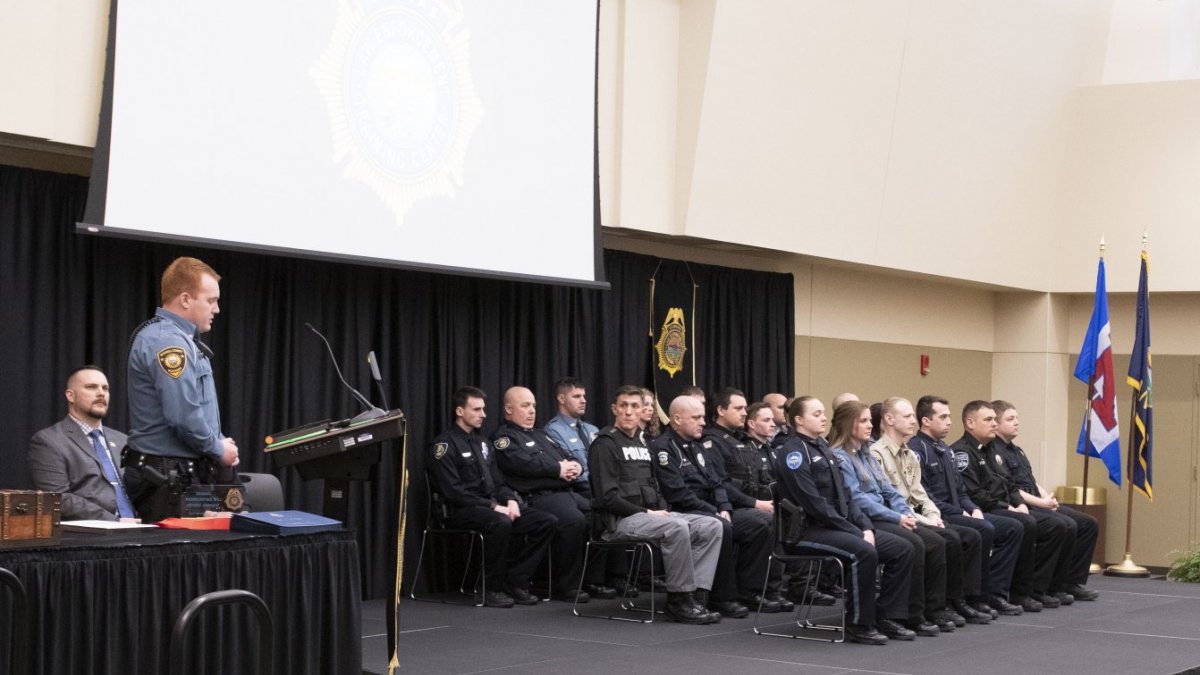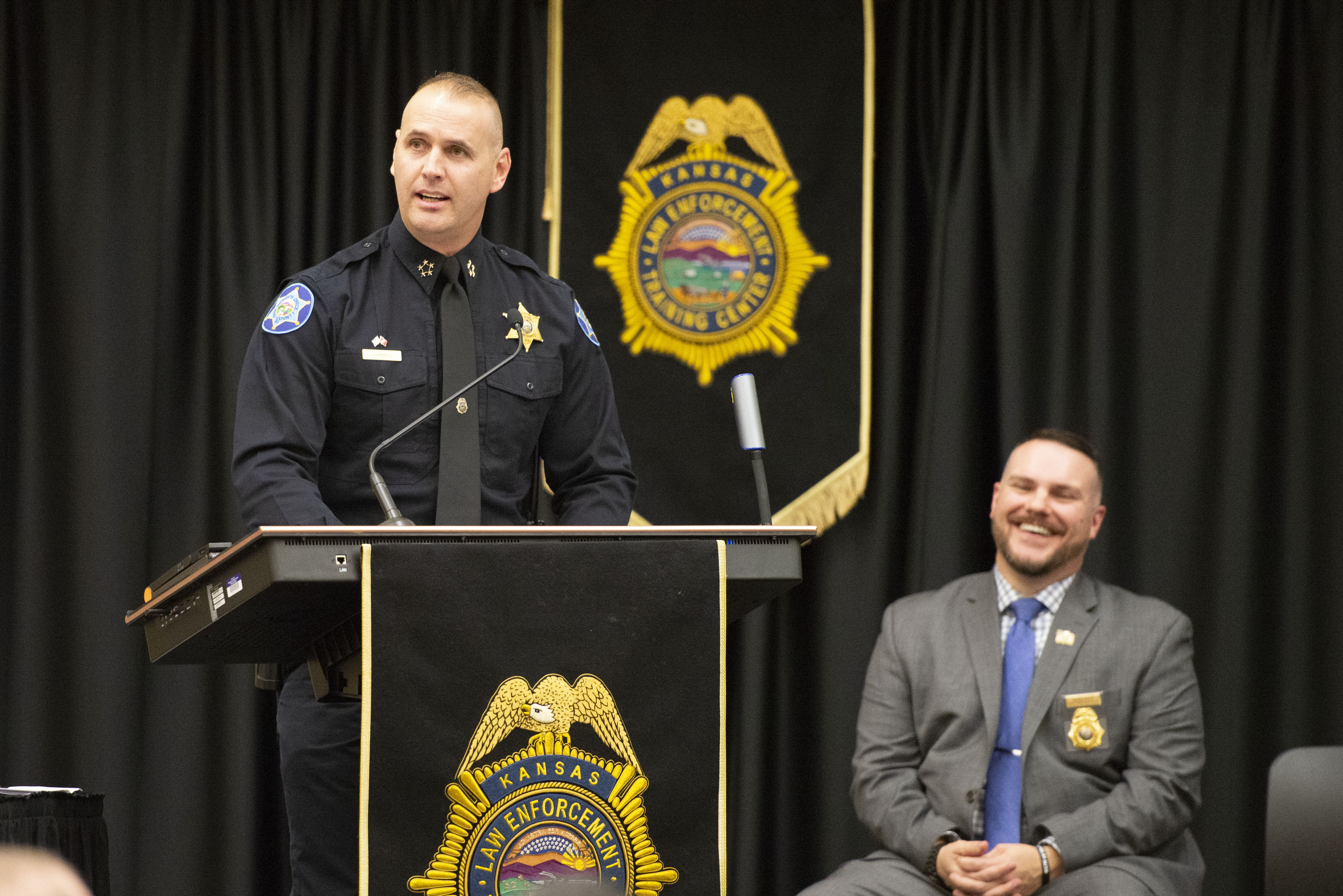Kansas Law Enforcement Training Center Graduates 261st Basic Training Class

Twenty-one new law enforcement officers graduated from the Kansas Law Enforcement Training Center (KLETC) on Jan. 24. Reno County Sheriff Darrian Campbell was the speaker for the ceremony in KLETC’s Integrity Auditorium.
The new officers were members of the 261st basic training class. The graduates, who began their training in Sept. 2019, represented 18 municipal, county and state law enforcement agencies from across Kansas.
Graduates receive certificates of course completion from KLETC and Kansas law enforcement certification from the Kansas Commission on Peace Officers’ Standards and Training, the state’s law enforcement licensing authority. The training course fulfills the state requirement for law enforcement training. Classroom lectures and hands-on applications help train officers to solve the increasingly complex problems they face in the line of duty.
Established by the Kansas Legislature in 1968, KLETC trains the majority of municipal, county and state law enforcement officers in Kansas and oversees the training of the remaining officers at seven authorized and certified academy programs operated by local law enforcement agencies and the Kansas Highway Patrol.
About 300 officers enroll annually in KLETC 14-week basic training programs. KLETC offers continuing education and specialized training to over 10,000 Kansas officers each year. KLETC is located one mile west and one mile south of Yoder, near Hutchinson, and is a division of University of Kansas Professional & Continuing Education.
Graduates who granted permission to release their names are listed below by county and agency:
Allen County
- Levi Anstaett - Iola Police Department

Commencement speaker Sheriff Darrian Campbell of Reno County addresses the graduating class.
Anderson County
- Kady Kratzberg - Anderson County Sheriff’s Office
Cheyenne County
- Sean Preston - Cheyenne County Sheriff's Office
Cowley County
- Aaron Conley - Cowley County Sheriff's Office
Dickinson County
- Jonathan Thompson - Herington Police Department
Doniphan County
- Mitchell Cheek - Iowa Tribal Police Department
Ellis County
- Alex Broadway - Hays Police Department
- Aaron Ewy - Hays Police Department
Jackson County
- Justin Wunder - Prairie Band Pottawatomi Tribal Police
Lyon County
- Reagan McClellan - Emporia Police Department
Mitchell County
- Garret Paul Mathews - Mitchell County Sheriff’s Office
Osage County
- Megan Osladil - Osage County Sheriff’s Office
Reno County
- Michael Knopp - Buhler Police Department
- Dylen Snedeker - Reno County Sheriff’s Office
Saline County
- Tyler Casteel - Saline County Sheriff’s Office
Stevens County
- Douglas Davis - Hugoton Police Department
Woodson County
- Vinson Baker - Yates Center Police Department
Wyandotte County
- Michael Clark - University of Kansas Med Center Police Department
Learn more about the Kansas Law Enforcement Training Center.
About the University of Kansas Professional & Continuing Education
KU Professional & Continuing Education supports the teaching, research and public service missions of the University, contributing to postgraduate professional education, workforce development, distance learning and quality of life for Kansans and worldwide communities. Other programming within Professional & Continuing Education includes Professional Programs, Aerospace Short Courses, Osher Lifelong Learning Institute, Kansas Law Enforcement Training Center and Kansas Fire & Rescue Training Institute. Combined, these programs teach more than 30,000 individuals a year in every county in Kansas, across the United States and internationally. It is headquartered at the KU Edwards Campus in Overland Park, Kansas.
About the Kansas Law Enforcement Training Center
Established by the Kansas Legislature in 1968 as the central law enforcement training facility for our state, the Kansas Law Enforcement Training Center (KLETC) serves as the headquarters for all law enforcement training in Kansas. Located at the former naval air station south of Hutchinson and west of Yoder in Reno County, Kansas, the Center’s mission, as expressed in the Law Enforcement Training Act, K.S.A. 74-5601 et. seq. is “the promotion and development of improved law enforcement personnel and procedures throughout the state, and the training center shall offer to qualified applicants such programs and courses of instruction designed to fulfill this end.” KLETC directly trains the overwhelming majority of municipal, county and state law enforcement officers in Kansas, and oversees, supervises and monitors the training of the remaining officers at eight authorized and certified academy programs operated by local law enforcement agencies and the Kansas Highway Patrol.





